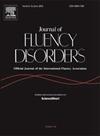A qualitative investigation of how stutterers perceive social interactions
IF 2.1
3区 医学
Q1 AUDIOLOGY & SPEECH-LANGUAGE PATHOLOGY
引用次数: 0
Abstract
Purpose
The purpose of this study was to examine the social perceptions that stutterers hold about their communication partners with the goal of understanding why some situations are more challenging for stutterers than others.
Method
Fifteen adults who stutter were interviewed for one hour each to explore their perceptions and evaluations of their listeners. The interviews were analyzed using reflexive thematic analysis.
Results
Participants expressed uncertainty about how their listeners would respond to their stuttering. Many reported feeling more discomfort when stuttering around unfamiliar communication partners due to concerns about making a negative first impression. All participants felt judged due to their stuttering, and many experienced pressure to be fluent. Meta-perceptions of communication partners played a crucial role in determining how difficult the social interaction was perceived to be.
Conclusions
This study highlights the challenges adults who stutter may face in social situations, revealing the nuanced complexities of stuttering within social interactions. It highlights the significant impact of listener behavior and stutterers’ meta-perceptions on stuttering events. These findings provide a rich analysis of how stutterers interpret social interactions and can form the basis of quantitative investigations into how social perceptions are related to stuttering events.
一项关于口吃者如何感知社会互动的定性调查
目的本研究的目的是研究口吃者对其交流伙伴的社会认知,以了解为什么有些情况对口吃者来说比其他情况更具挑战性。方法对15名口吃的成年人进行了一小时的访谈,探讨他们对听众的看法和评价。访谈采用自反性主题分析。结果参与者表示不确定他们的听众会如何回应他们的口吃。许多人表示,由于担心留下负面的第一印象,在不熟悉的交流对象面前结巴会感到更不舒服。所有的参与者都觉得自己的口吃是被人评判的,很多人都经历了说流利英语的压力。沟通伙伴的元知觉在决定社会互动的困难程度方面起着至关重要的作用。结论:这项研究强调了口吃的成年人在社交场合可能面临的挑战,揭示了口吃在社交互动中的微妙复杂性。它强调了听者行为和口吃者的元知觉对口吃事件的显著影响。这些发现为口吃者如何解释社会互动提供了丰富的分析,并可以形成定量调查社会认知与口吃事件之间关系的基础。
本文章由计算机程序翻译,如有差异,请以英文原文为准。
求助全文
约1分钟内获得全文
求助全文
来源期刊

Journal of Fluency Disorders
AUDIOLOGY & SPEECH-LANGUAGE PATHOLOGY-REHABILITATION
CiteScore
3.70
自引率
14.30%
发文量
23
审稿时长
>12 weeks
期刊介绍:
Journal of Fluency Disorders provides comprehensive coverage of clinical, experimental, and theoretical aspects of stuttering, including the latest remediation techniques. As the official journal of the International Fluency Association, the journal features full-length research and clinical reports; methodological, theoretical and philosophical articles; reviews; short communications and much more – all readily accessible and tailored to the needs of the professional.
 求助内容:
求助内容: 应助结果提醒方式:
应助结果提醒方式:


